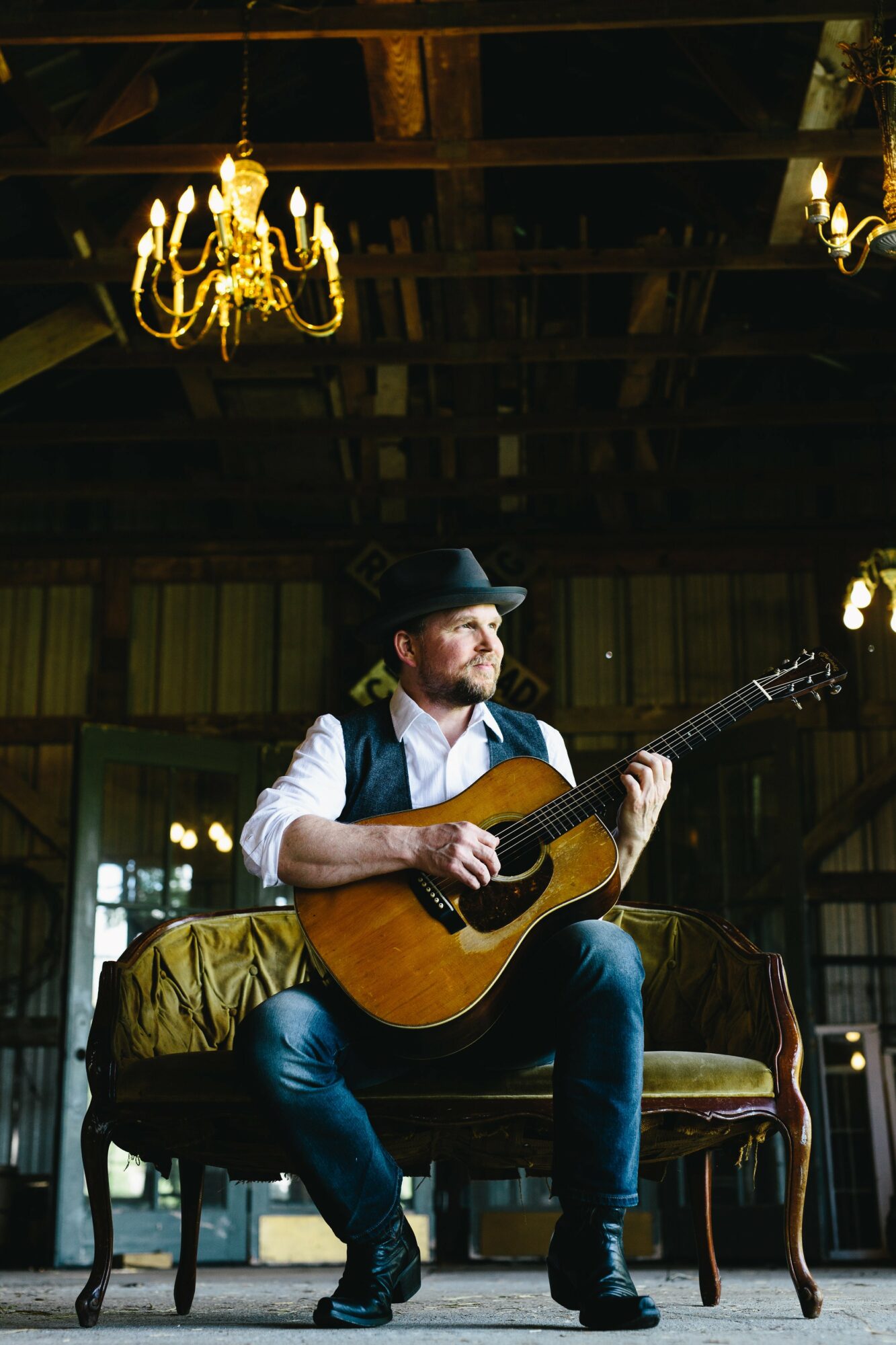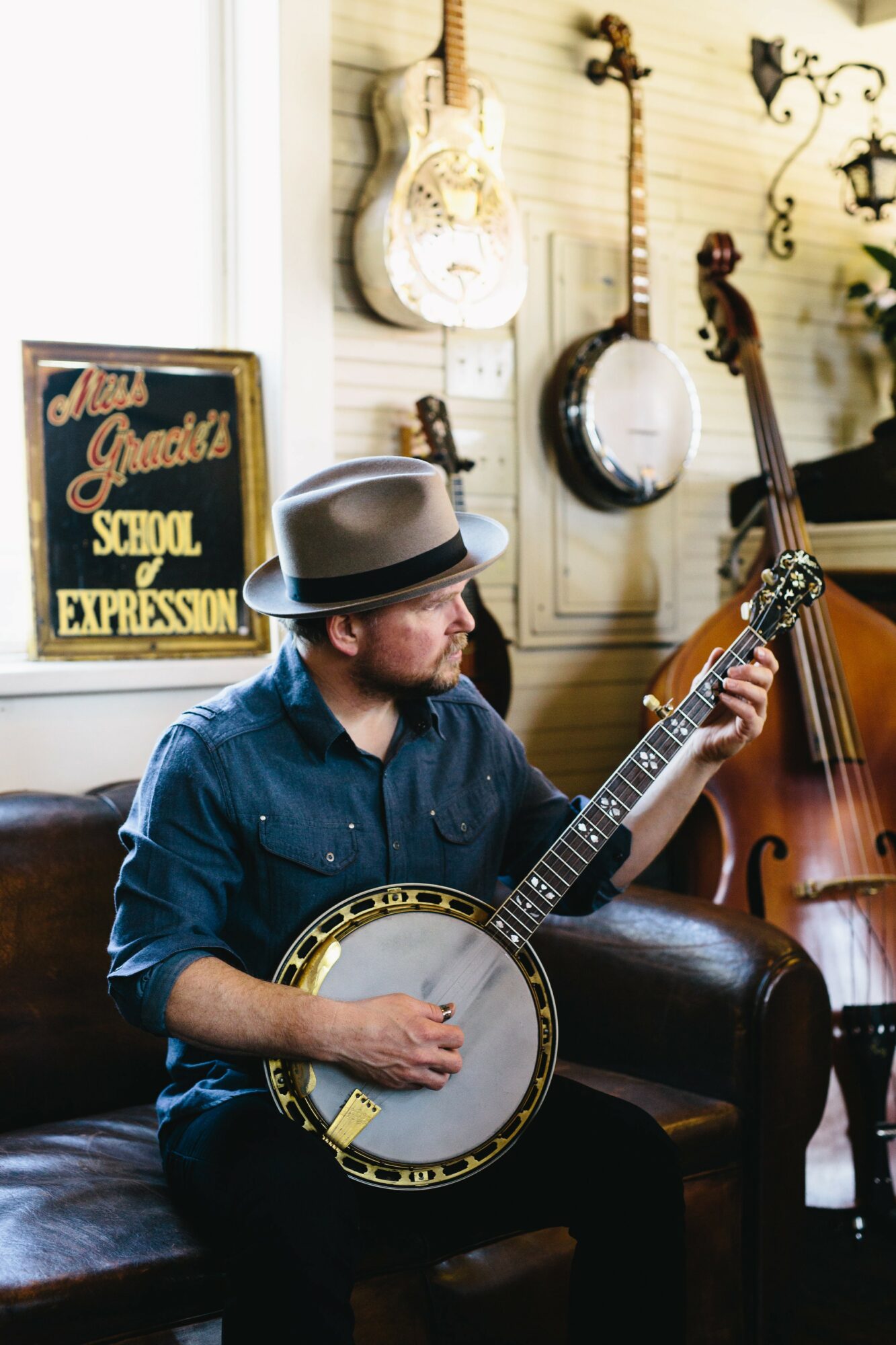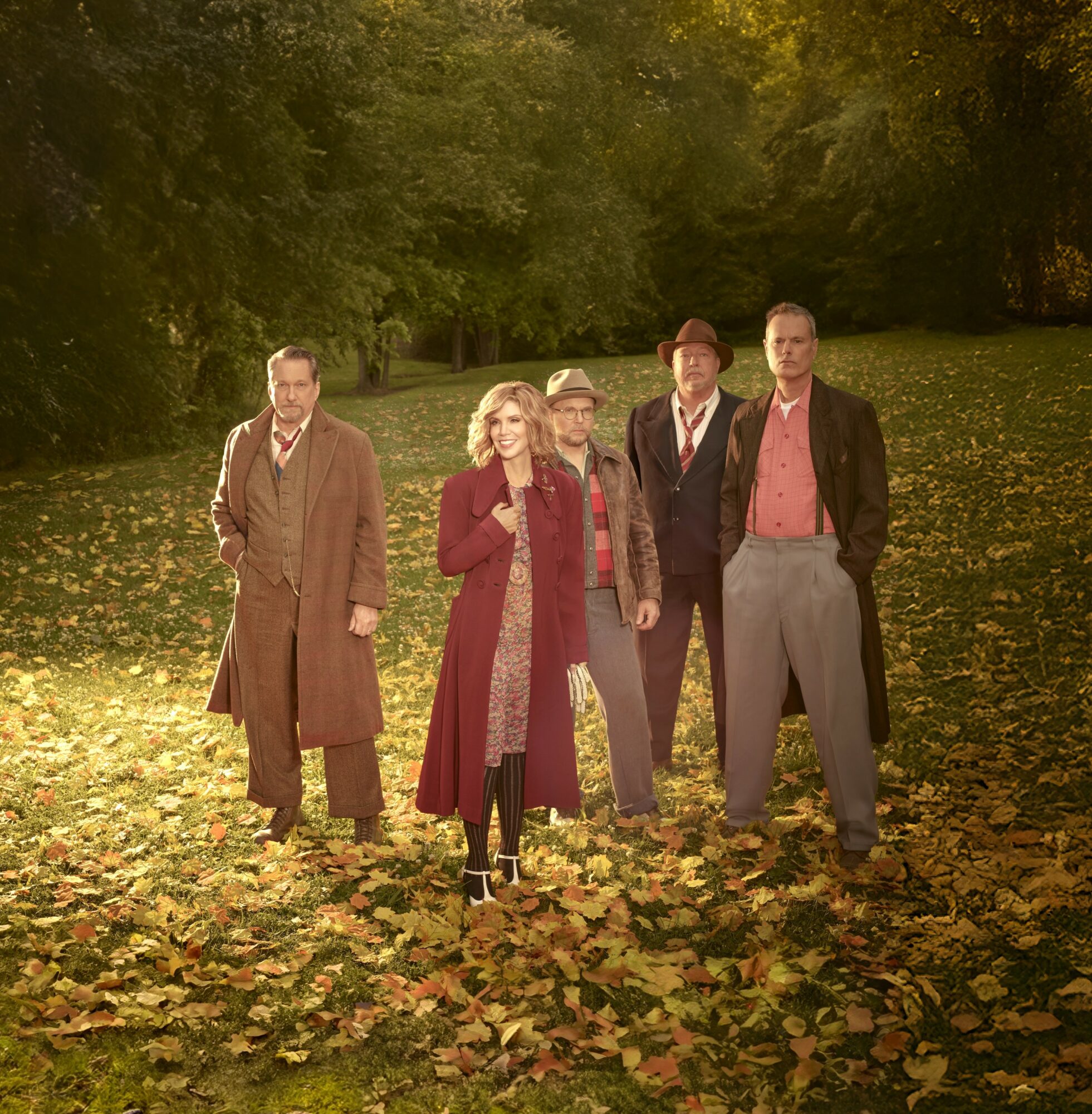

Today we’d like to introduce you to Ron Block
Hi Ron, we’d love for you to start by introducing yourself.
I grew up in California – my Mom loved music, and the first album I remember hearing and seeing was her copy of Marty Robbins’ Gunfighter Ballads and Trail Songs.
My Dad owned a music store in Lawndale called Hogan’s House of Music, which sold guitars and other instruments, keyboards, pro audio, drums, etc.
I wanted a guitar at 11 years old, and I mostly strummed cowboy songs like Streets of Laredo. Around 13 I heard bluegrass music for the first time. Dad bought me a banjo, and he tells it “I got you a banjo at 13 and you didn’t come out of your room until you were 21.”
For the rest of my teen years I worked for Dad at the store and played bluegrass. At about 17 I started loving all the music the guys were playing at the store – rock and blues and jazz, everything from Leslie West, AC/DC, and Pat Metheny to Ray Charles, James Taylor, and Bonnie Raitt. I got into electric guitar at that point, and every day in my practice I’d roam from banjo to bluegrass guitar to electric and back again.
I started playing in local bluegrass bands as soon as I could drive and by 20 I’d progressed to regional bands. By 23 I’d toured as far east as Nashville and as far north as Chetwynd, British Columbia. I was meeting and jamming with a lot of other musicians, including Barry Bales, Adam Steffey, Dan Tyminski, Tim Stafford, and Alison Krauss – all players who would eventually be in Alison Krauss & Union Station.
I met my wife Sandra in 1987 while on a trip to Canada; she’s an Alberta girl and one of the most sensible, rock-solid, good-hearted, fun people I’ve ever met. We married a year later, and moved to Nashville in late 1990.
In October of 1991 Alison called and asked me to join their band. I was 27. We had several days of rehearsal, and my first weekend with the band was Austin City Limits, the television segment of the Opry, and a taping of Hee Haw. I’d never done television before, but it was so much fun playing music with the band I wasn’t too nervous.
I’ve played with AK + US ever since, from all the early ’90s festivals we played, through the mid-1990s phase of “When You Say Nothing At All,” Jerry Douglas joining in 1998, playing on the O Brother, Where Art Thou soundtrack, and on through to our last tour as AKUS in 2015.
Alison toured her album Windy City from 2017-2019. I played mostly guitar, with bassist Barry Bales, drummer Jay Bellerose, Matt Rollings on piano, James Mitchell on electric guitar, Sidney Cox and Suzanne Cox, and then Jeff White coming in the second or third year.
We’ve currently been making some new music with Alison Krauss + Union Station, and the Arcadia tour will be running from mid-April to the end of September 2025. I’m really looking forward to going back out with the band.
Along the way in my career I’ve gotten to play on albums by various artists: Dolly Parton, Willie Nelson, Vince Gill, Alan Jackson, Reba McEntire, Brad Paisley, Clint Black, and more. I also played on a fun Bill Frisell album called Nashville, back in the 90s.
Since 2012 some of my favorite tracks I’ve played on are by an artist named Kate Rusby, from Yorkshire, England. In some ways she is a like an English version of Alison in that they both take roots music and make it fresh for new audiences. Both are strong women who have made music on their own terms.
I’ve made two albums with her producer, bandleader, and husband, Damien O’Kane, a musician from North Ireland. Along with being an amazing guitarist and vocalist, he’s also a fantastic tenor banjo player. We make music using our two banjos, plus a great rhythm guitarist and a top Scottish bassist. We combine Celtic music with bluegrass, writing tunes that meld the two traditions, and we’re currently working on a third album. It’s wide-open, creatively, and I have loads of fun with those guys. Most of our touring has been in the UK and Ireland, but I hope to bring that over here at some point.
I’m also in a bluegrass band called Southern Legacy, with four guys who grew up loving a lot of the same bluegrass I did. We’ve done a lot of festivals this year, and we’re currently recording our first album.
Last year I did quite a few gigs with the great singer and songwriter Sandra McCracken. It’s been a blast to play so much electric guitar, and we’re currently recording some folkier stuff. She is brilliant.
I’m sure it wasn’t obstacle-free, but would you say the journey has been fairly smooth so far?
It wasn’t easy to make a living after I quit my Dad’s music store and the band I was in at 21. With those two jobs, I made really good money for a teenager. But I wanted to make my sole living as a musician; I knew I couldn’t stay in California and do that.
My mother raised me to believe God loves me and that what he says in his word is true – that I can rely on that. This was an essential factor in becoming a musician. Jesus’s words in Matt 6:31-34 were always relevant. “”Therefore do not worry, saying, ‘What shall we eat?’ or ‘What shall we drink?’ or ‘What shall we wear?’…For your heavenly Father knows that you need all these things. But seek first the kingdom of God and His righteousness, and all these things shall be added to you. Therefore do not worry about tomorrow, for tomorrow will worry about its own things. Sufficient for the day [is] its own trouble.”
He’s not saying, “Don’t worry.” He’s saying, “Don’t worry. You have the One who owns and knows everything as your keeper and guide. Look to him, and look for him to be in every situation, and things will work out much better than if you were strained and stressed and frustrated.”
He’s saying to replace worried thoughts with the recognition of God as Provider. I couldn’t have focused so deeply on music in those early years had I been eaten alive with worry that I might not be able to support myself.
Another area of struggle: as a teen and in my twenties I didn’t realize how much of my identity as a person was becoming entangled in being a musician. I was increasingly getting my sense of who I am from how well I played and whether or not people liked it, especially the musicians around me.
When our identity comes from any of our behavior it can create a short circuit. When our behavior falls short, we feel our identity is endangered.
I had several years of this in the 90s and it wasn’t fun. But it taught me God, through Christ, is only real, true, lasting source of my identity. He’s the underlying source, and now when I forget that temporarily I can turn back to him with renewed trust.
Thanks for sharing that. So, maybe next you can tell us a bit more about your work?
I specialize in banjo and acoustic guitar, and also play electric guitar. I write songs and instrumental tunes, and occasionally produce. I have a studio and engineer projects I’m creating, playing on, or producing. In general, I love creating.
As a teen and through the present day, I was big into what is called traditional bluegrass – the music of the founders of the genre, Bill Monroe, Flatt & Scruggs, Reno & Smiley, the Stanley Brothers, Jimmy Martin, and also the second-generation musicians: J.D. Crowe & the New South, Larry Sparks, Tony Rice, and many more.
In my late teens, working at Dad’s store, I heard all kinds of other sounds. Blues, rock, jazz. I began to dig into those genres as well. I loved especially the string-bending sounds of electric blues and older country music. Another element of this was Larry Carlton. He had a great instructional video where he talked about the technique of string bending, and it made a deep impression on me.
It was in the clash of these two seemingly contrary loves that I began playing around more with string bending on the banjo and acoustic guitar, and it was in those early days with AKUS that this stylistic approach came to fruition; that, along with all the rest of AK+US as players, helped mark out the sound of our band. In order to have a band sound be instantly recognizable, you have to think and play differently.
The other thing I learned, early on, from all the great music I listened to is that you can put your heart, soul, and love into every note. A friend played a song on the banjo called “Wild Bill Jones” that we recorded years ago. I said, “That’s good. Now play it like you’re Wild Bill Jones. You found a guy trying to make time with your girlfriend. You gave him a warning, and when he didn’t stop you shot him. Now you’re in jail about to hang.”
And lastly, through playing with Alison, I learned a kind of minimalism – to play only what is necessary. Music is like speech, or a conversation. Some people talk a whole lot and say very little worth saying. Some can say a whole lot with a few words.
I want to be like that in music and in speech. I’ve got a long way to go on the speech side, but musically I’ve come a long way.
What quality or characteristic do you feel is most important to your success?
One major thing is having a work ethic: consistent, frequent, and repetitive daily warmup and practice. I would never have gotten the place with AK+US had I not been so focused. All that listening I did, all the study, and then all the experimentation with those ideas – all of it made me into the kind of player they noticed. I’m thankful my parents allowed me the freedom to practice and play for hours a day. Dad built me a room in the garage, with the heavy door going into the house, so I could play at all hours.
I was taught a work ethic, I think, by watching both my Dad and Mom. Dad had the music store and went to work every day. Mom worked hard, mostly as a waitress.
The other thing, and really most important for me because it’s the grounding of work ethic, is trust in God. Trust imparts hope – an expectation of good things coming. Hope is the energy to do the work in a focused way, and to be present in it, because I can live in the moment of practice, expecting good to come of it, leaving the future to God. The times I’ve had most struggle with moving forward are when the flow of trust has slowed – in which case I go back and resow seed from the word of God.
Contact Info:
- Website: https://ronblock.com
- Instagram: ronblockakus
- Facebook: ronblockmusic


Image Credits
Both of my pictures: Crystal K. Martel
Alison Krauss & Union Station photo: Randee St. Nicholas












